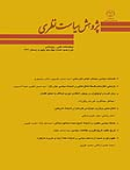زبان، قدرت و ایدئولوژی در رویکردِ «انتقادیِ» نورمن فرکلاف به تحلیلِ گفتمان
محورهای موضوعی : پژوهش سیاست نظریجهانگیر جهانگیری 1 * , علی بندرریگیزاده 2
1 -
2 -
کلید واژه: تحلیلِ گفتمانِ «, انتقادی», صورتبندیهایِ ایدئولوژیکی- گفتمانی طبیعیسازی پنهانسازی نظامِ گفتمان,
چکیده مقاله :
با توجه به نقشی که زبان در ساختار قدرت ایفا میکند - و چه بسا ممکن است که زبانِ یک گروه، تبدیل به ایدئولوژیِ حاکم شود - و با توجه به اینکه موضع یک طرف را نسبت به طرفِ دیگر تعیین می کند و با توجه به اهمیتی که هماکنون در سازمان های بین المللی و کردارهای دیپلماتیک برای آن قائل هستند، توجه به پدیدۀ زبان و گفتمان و کاوش در جهت تحلیلِ آن، ضرورتی است که کمتر بدان پرداخته شده و می شود. اینچنین است که توجه و پرداختنِ به مکاتب، نظریه ها و روش های موجود در تحلیل گفتمان، ضروری و اجتنابناپذیر می گردد. این مقاله، به کاوش در رویکرد تحلیل گفتمانِ انتقادی می پردازد و می کوشد تا با استفاده از نظریات یکی از اعضای پیش رویِ آن یعنی «نورمن فرکلاف»، به آشکارسازی خصوصیات این رویکرد و وجوه تمایز آن از سایر رویکردهایِ تا حدی مشابه پرداخته، رابطۀ میانِ زبان، قدرت و ایدئولوژی را در آن مورد مداقه قرار دهد.
Critical discourse analysis (CDA) started in the early 1990s and has become a well-established field in the social science in the twenty-first century .CDA can be defined as a problem-oriented interdisciplinary research program. In general, power, and especially institutionally reproduced power, is central to CDA. The purpose of CDA is to analyze opaque as well as transparent structural relationships of dominance, discrimination, power and control as manifested in language. CDA states that discourse is an instrument of power. The way this instrument of power works is often hard to understand, and CDA aims to make it more visible and transparent. A critical discourse analysis should not be a discourse analysis that reacts against power alone. It should be an analysis of power effects, of the outcome of power, of what power does to people, groups, and societies, and of how this impact comes about. The deepest effect of power everywhere is inequality, as power differentiates and selects, includes and excludes. CDA is an approach to the analysis of discourse which views language as a social practice and is interested in the ways that ideologies and power relations are expressed through language. It wants to understand how language is used to create, maintain and challenge power relationships and ideologies. Norman Fairclough is one of the most famous thinkers of CDA. He seeks to develop ways of analyzing language which address its involvement in the working of contemporary capitalist societies. He is working in a tradition of critical social research which is focused on better understanding of how and why contemporary capitalism prevents or limits, as well as in certain respects facilitating, human well-being and flourishing. Such understanding may, in favorable circumstances, contribute to overcoming or at least mitigating these obstacles and limits.

